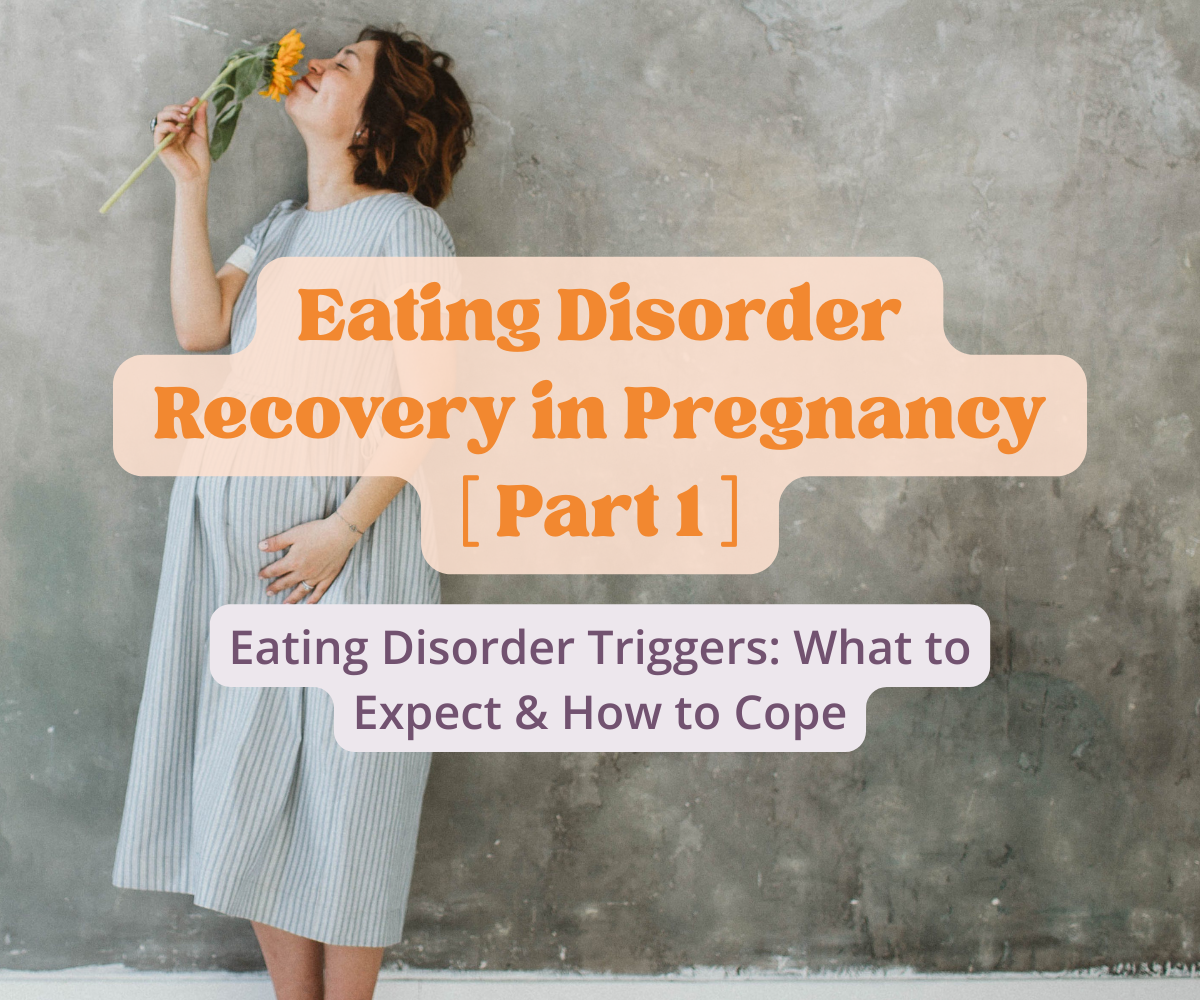Eating Disorder Triggers in Pregnancy: What to Expect and How to Cope
This post is Part 1 in my “Pregnancy and Eating Disorder Recovery” series, where we cover fertility, pregnancy triggers, medical care, and postpartum challenges.
If you’re pregnant and currently in recovery from an eating disorder, you’re not alone if you feel a little unsettled. On one hand, you may feel grateful for the chance to carry a baby. On the other, watching your body change and facing constant weight surveillance can make recovery feel shaky. It’s a complicated time that deserves more than quick reassurance.
I’m creating this series to walk with you through the most common challenges of pregnancy in eating disorder recovery. In this first post, we’ll look at fertility, how recovery affects conception, and the most common eating disorder triggers during pregnancy. In the next post, we’ll dive into how to advocate for yourself with your perinatal team.
A common fear for many in recovery is whether their ED history will affect their ability to conceive. So let’s start there.
Can You Get Pregnant After an Eating Disorder?
Many people wonder if past eating disorders make pregnancy impossible. The short answer is: no, but fertility can be affected depending on the type and severity of the disorder.
How eating disorders affect fertility
For example, anorexia and bulimia can disrupt ovulation, while binge eating disorder may increase risk of conditions like PCOS. ARFID (avoidant restrictive food and intake disorder) can lead to nutritional deficiencies that compromise both mom and baby’s needs.
When your body isn’t getting enough fuel, it goes into conservation mode. The energy you do take in gets funneled toward keeping your heart beating and brain working. Over time, that means other systems, like digestion or reproduction, get put on the back burner. It’s the body’s way of choosing survival over things it sees as “optional,” like making hormones or preparing for pregnancy.
Eating disorders and chaotic, unpredictable eating patterns place a burden of stress on the entire body. Fertility thrives when the body feels safe, secure, and predictable – with stable blood sugar and adequate fuel. Nutrient deficiencies in eating disorders are common and can impair hormone production as well. However, the most important factor in supporting fertility is consistently nourishing your body, day in and out.
What to know about conceiving after recovery
Recovery lays the foundation for your body to function the way it’s meant to. Consistent nourishment, gentle movement, adequate rest, and coping skills that support emotional health all help restore a reproductive system that’s capable of carrying a healthy pregnancy.
If your body has been in a weight-suppressed state, part of recovery may include weight restoration and eventually weight stabilization. Adequate fat stores are what your body uses to make hormones, sustain ovulation, and prepare for the energy demands of pregnancy.
It’s important to acknowledge that conception is still possible even when someone is actively struggling with an eating disorder. For some, pregnancy can quiet disordered behaviors as the focus shifts toward caring for the baby. For others, the physical and emotional changes of pregnancy can feel overwhelming and trigger more eating disorder behaviors.
Research shows that entering pregnancy with an active eating disorder or while still early in recovery does carry some risks. These include complications like preterm birth, low birthweight, or difficulties with breastfeeding in postpartum*. This doesn’t mean a healthy pregnancy is necessarily impossible, but it highlights how essential support can be during this time.
The most protective step you can take is building a care team you trust and being open about your history. Having providers who understand eating disorders allows you to get the monitoring, reassurance, and encouragement you need to care for yourself and your growing baby.
Why Pregnancy Can Challenge Recovery
Everyone’s experience during pregnancy will be a little different depending on someone’s stage of recovery, the function of the eating disorder behaviors, pregnancy symptoms, and the type of care they receive.
There’s no question that parts of pregnancy can be challenging to someone with an eating disorder history. One survey of pregnant people with ED history found that 95% of respondents experienced worsening symptoms or relapse of their eating disorder during pregnancy. One important caveat here is that this study did not interview individuals with Binge Eating Disorder, so that experience was not captured.
Common triggers during pregnancy
Pregnancy comes along with a lot of uncertainty, body changes, and a lack of control that can feel destabilizing. It can sometimes feel comforting to turn to past eating disorder behaviors to cope. Pregnancy symptoms like nausea and vomiting can also complicate recovery and trigger relapse for some.
Common eating disorder triggers during pregnancy include:
- Weight gain and normal body changes during pregnancy
- Weight checks and body surveillance by medical providers
- Morning sickness and food aversions
- Food cravings
- A diagnosis of gestational diabetes
- Other pregnancy complications
- Identity shifts in motherhood
- Perinatal depression and anxiety
Pregnancy can stir up a lot of complicated feelings when you’re in recovery, and it’s normal if you recognize yourself in some of these triggers. Naming them is an important first step toward reducing their power. Remember: your body is resilient, and your recovery can grow stronger through pregnancy, especially with the right support.
In the next part of this series, we’ll talk about how to navigate medical care – like weight checks, provider comments, and building a team that truly supports your recovery.
Coping with Pregnancy-Related Triggers
When pregnancy care stirs up eating disorder thoughts or urges, the first step is simply noticing (without judgment) what feels activating. Naming the trigger (“I feel anxious after getting my weight checked” or “Food aversions are making me want to restrict more”) helps create space between the feeling and the behavior. From there, leaning into recovery tools like grounding practices, journaling, bringing a support person to appointments, or setting clear boundaries with providers, can make the process less overwhelming. It can also help to focus on the bigger picture: pregnancy isn’t about always having control or doing everything perfectly, but about doing the best you can to nourish yourself and your growing baby with compassion. If you find yourself slipping back into old patterns, that doesn’t mean you’ve failed or that all is lost — it’s a cue to reach out for more support, whether from your therapist, dietitian, or another trusted member of your care team.
Practical ways to cope with pregnancy-related eating disorder triggers:
- Find ED-informed providers to work with so can be supported by professionals who can help guide you through this season with empathy, compassion, and confidence.
- Set boundaries with weight and body talk – ask to step on the scale backward or decline weight discussions if they’re not medically necessary. Change the conversation when weight or body talk comes up in conversation with friends or family.
- Bring a support person to appointments for reassurance and accountability.
- Practice grounding techniques (deep breathing, time outside, or a guided meditation) when ED thoughts arise.
- Keep meals predictable – aim for consistent eating patterns even when nausea, cravings, or aversions show up. Work with your dietitian to help create a supportive plan that works for you.
- Shift your focus – reframe changes in your body as signs of your baby’s growth and health, not personal “failures.”
- Stay connected – reach out to your therapist, dietitian, or a trusted friend when triggers feel too heavy to manage alone.
- Give yourself grace – remember that needing extra support during pregnancy isn’t weakness, it’s your internal wisdom guiding you to do the best thing for you + your baby.
Resources & Support
If you’re reading this and finding yourself struggling, please know you are not alone and you don’t need to push through it by yourself.
- 📞 NEDA Helpline: Call or text 1-800-931-2237 for confidential support.
- 📱 In the U.S., you can also dial 988 to connect with the Suicide & Crisis Lifeline if you’re in immediate crisis.
- 🌍 Outside the U.S.? Find international hotlines here.
And if you’re looking for compassionate, weight-inclusive nutrition support during pregnancy, postpartum, or while trying to conceive, I’d be honored to walk alongside you. You can learn more about working with me here.

